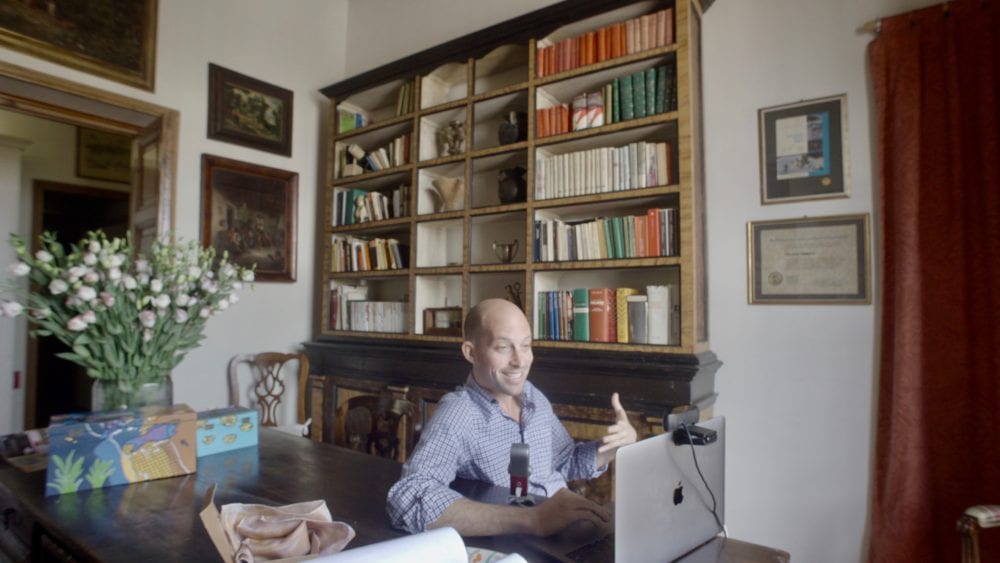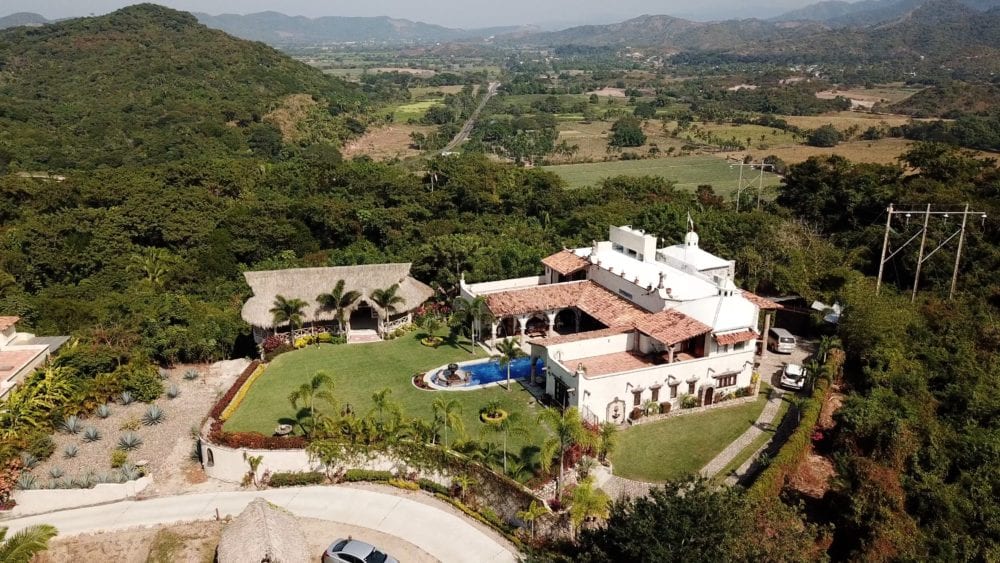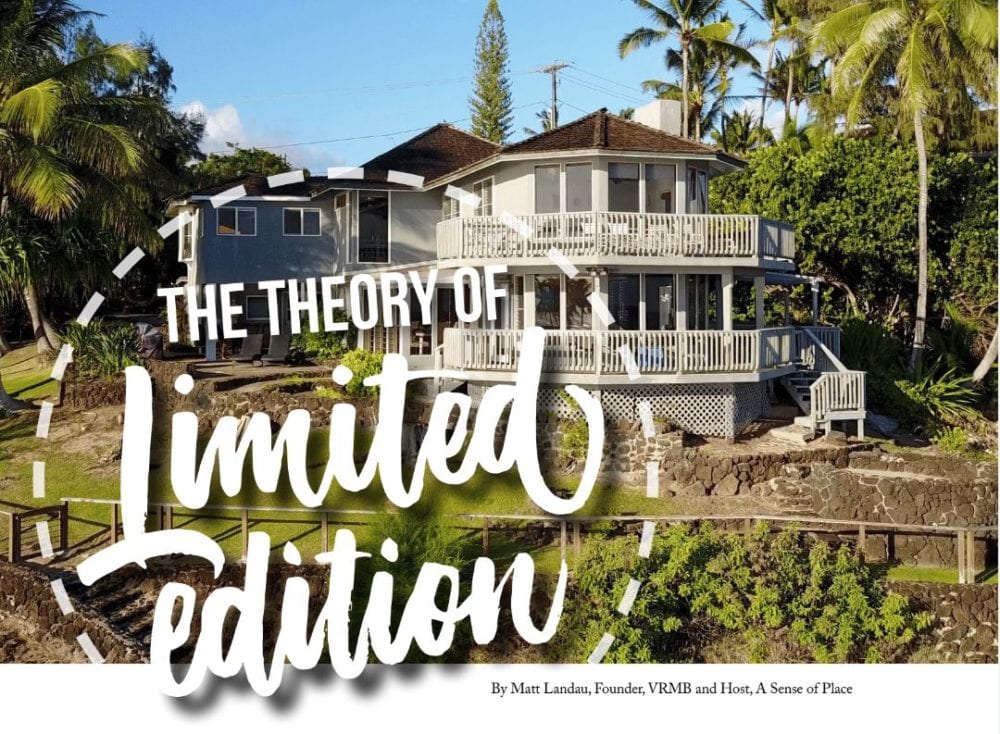I would like to share what I feel is the most radical concept in the vacation rental industry today—the theory of limited edition—which argues that, contrary to large OTAs and corporate growth, focusing on the elements of a business that do not scale is the most viable (and enjoyable) path for independent vacation rental success. Formulated over the past two years with the help of our Inner Circle Community, the theory of limited edition reminds us that we have everything we need to succeed.
Commodity versus Limited Edition
The theory first began with a very serious realization. As the vacation rental industry grows, independent owners and managers are being forced to choose between two polar opposite business models: the commodity vacation rental and the limited edition. There is increasingly less opportunity for success anywhere in between.
Commodity vacation rental businesses should not be looked upon negatively because they are the standardized businesses—the completely stocked kitchens, the online booking functionality, the hotel-level cleanliness—mainstream travelers want and need. Let’s face it, until a new industry has baseline standards, first-time vacation rental travelers won’t know what to expect (as a consequence, we will almost inevitably let them down). The biggest caveat (for homeowners) with the commodity model is that it plays into the hands of big business wealth and strength—the proverbial Goliath. The game of standardization is one in which big hotel chains or even companies like Vacasa or TurnKey are poised to conquer with only small tweaks to their already well-oiled systems and processes. It’s a game in which independent owners and managers will have a tough time competing because it’s all about scale. In a match of strength versus strength, Goliath wins almost every time.
However, the opposite of the commodity vacation rental business model is the limited edition. The limited-edition business does all of the things a commodity business does but with an additional layer of personality, style, and differentiation. Fortunately, these are the things small business owners already possess, so crafting a limited edition business model is more about discipline and deliberate choices than it is rocket science. Limited edition means going against the grain and building yourself a business that is protected and whose success is defined on your own terms. It is the case in which David changes the terms of the playing field and pulls out his slingshot—and his chances at success increase dramatically. Let’s dive into how this theory was born as well as some of the factors that contribute to its success.
The Wonderful World of Collector’s Items
When I first visited the neighborhood of Casco Viejo in Panama (a neighborhood I would go on to call home for twelve years), I walked around with a real estate agent named Patrizia, who explained there were strict preservation laws in place because the historic district was a UNESCO World Heritage Site. Developers could not build up or out in Casco Viejo, and they had to stick with the original, historic facades. This meant there would only be a fixed number of properties on the market in the entire neighborhood. Buying real estate in Casco Viejo was, as Patrizia said, “a limited-edition investment.”

I really enjoyed this concept and began to explore what it meant in other areas of business and pleasure when I discovered Antiques Roadshow, a television show on PBS in which people submit antiques for appraisal by experts. What I noticed about one-of-a-kind antiques (as they related to real estate in Casco Viejo) was that limited supply preserved the value of the items. With this in mind, I focused on the elements of our businesses that cannot be replicated or mass-produced, and I began to look at the independent vacation rental niche. How could independent owners and managers use this idea of limited edition to harness what makes them so special and use that to change the terms of the playing field against the bigger, richer OTAs?
Supply-Limiting Factors
When it comes to vacation rentals, I began to notice there were two kinds of “supply-limiting” factors worth considering. The first is external factors that are outside of our control, such as beachfront properties, of which there are only so many. The penthouse is another nice example because there’s typically only one per building. Architectural homes, mountain-top properties, and one-of-a-kind views are all hard factors that contribute to a limited supply—thus, an irreplaceable vacation rental experience. These factors are worth considering when you acquire your next property or plan your next remodel.

Because so many of these external factors are outside of our full control and are expensive to obtain, the theory of limited edition chooses to focus on the second type of supply-limiting factor, the internal factors within us. These factors include style, tastes, preferences, and stories that are unique to each and every one of us. These internal factors are essentially free and accessible to all. So, I decided to dig deeper into how these natural strengths could be channeled and packaged into a marketing portfolio to stave off bigger, richer competition.
I began to interview limited edition entrepreneurs around the world—in the vacation rental industry and in small businesses in general—and eventually distilled their innovations into eight common factors that make up the prototypical limited edition vacation rental. They are, in no particular order, distinction, personality, names, surprises, customer zero, help don’t sell, parting thought, and landmarking (or anchoring). You can sign up for the complete limited edition workshop (www.vrmb.com/Ltd/) to learn more about these factors and how to boost your overall limited edition score.
Why Limited Edition?
This question is incredibly important because it is directly connected with our desired outcome. The more limited edition your business is, the less you have to worry about industry shifts or market corrections. The more limited edition your business is, the less you have to play by the commodity rules. The soft way of presenting this is that the factors involved with limited edition can help independent owners or managers carve out their own definition of success. The stronger way of presenting it—the method to which I subscribe—is that an independent owner or manager in our industry cannot succeed without it. Sway too far to the side of commodity and you’re in a race to the bottom. Meander too much in the middle and you’re swallowed whole.

Because this is still a working theory, limited edition comes with some asterisks. For instance, it’s worth noting that just because we say we are limited edition does not mean we actually are. If you’ve seen the “limited edition collectors coin” on infomercials late at night (it’s yours for just $19.99!), you catch my drift. You really need to demonstrate the factors. You can’t fake them.
Additionally, it’s important to remember that limited edition is not synonymous with price. Many limited-edition businesses are composed of less expensive materials than their commodity counterparts. Some limited edition efforts actually subtract value in the eyes of the general public (Google the phrase “Mario Balotelli camouflage car” and you’d argue that limited edition has made this item less desirable on the open market). In short, it’s not the price but the collection of eight factors that makes the limited-edition business more valuable and protected over the long haul.
Conclusion
As the theory of limited edition evolves, we’re left with what I like to refer to as “the million dollar” question. Once independent vacation rental owners or managers have figured out their limited edition profile, how do they scale? We understand limited edition as it relates to single use cases, but is it prohibitively small scale? This is a question we haven’t learned the answer to yet. This is a question that may remain unanswered for years to come. My hope is that publications like this one, aimed at documenting the strengths of independent owners and managers and the truest stakeholders in this industry—the pioneering homeowners who paved the way for the greatest travel trend of our lifetime—can help guide the way.



Comments are closed.